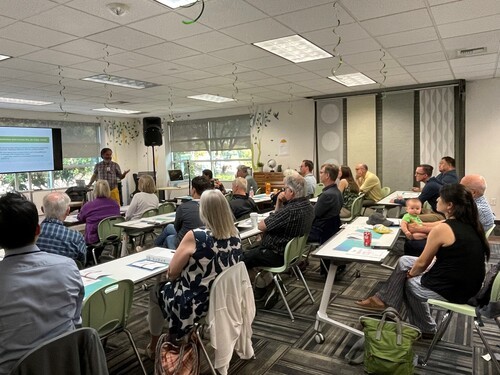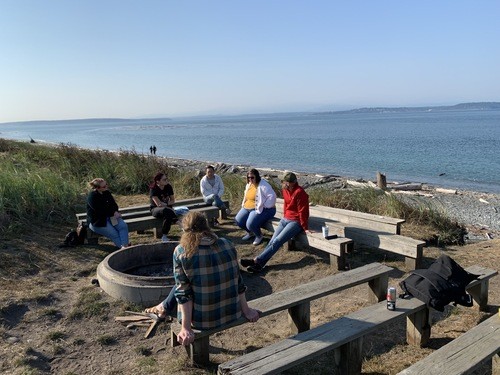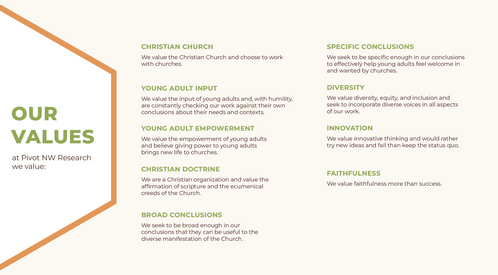What do we do?
Pivot NW Research is here, first of all, to tell you that you're not alone in your questions and struggles. Second of all, we're here to help. We gather, guide, and mentor churches to help them better understand young adulthood (which we define as ages 23-29) and build relationships with young adults in their communities.


What are we learning?
Our research has led us to many conclusions, the most important being that young adult involvement leads to healthier congregations. If you and your church feel called to develop relationships with the young adults in your community, Pivot NW Research can help. Read 5 Things You Can Do Right Now to get a head start. These steps have effectively helped our participating congregations attract, develop, and keep young adults in their communities. You can also check out our research page to get into the nitty-gritty of what we're learning.
How'd we get started?
Pivot NW Research, based at Seattle Pacific University, was launched through a $1.5 million grant from the Lilly Endowment. Dr. Jeff Keuss, professor of Christian ministry, theology, and culture, secured the funding in 2017 and serves as Executive Director and Principal Investigator. Under his leadership, the Pivot NW Research team works with faith communities in the Greater Seattle Area, helping them better understand the experiences of young adults and working with them to design, launch, and evaluate new ministries.


To whom are we talking?
We collaborate with SPU's Office of Diversity, Equity and Inclusion and SPU's University Ministries. While SPU is affiliated with the Free Methodist denomination, it is an ecumenical organization. Outside of the university, we invite locally and nationally recognized thought-leaders to share their expertise and innovation with our church partners. We draw on their knowledge and experience of faith-sanctified creativity, honest and humble critique of the church's engagement with culture, and constructive leadership formation. Specifically, we seek out people who are interested in community-building collaboration and reconciliation through a spirit of Christ-centered discipleship.
How do we approach our work?
The Pivot NW Research team takes an interdisciplinary approach; we are a combination of theologians and Industrial-Organizational Psychology PhD candidates and faculty. Working with the I-O Psych department allows us to do in-depth research that helps churches better understand young adults, themselves, and what it takes to create lasting change within their congregations.
Additionally, we've been talking with and researching young adults, learning about their perspectives and needs while also working with churches to guide them towards a better understanding of themselves so they can create new and innovative ministries to engage young adults. We want to help churches give agency to young adults, allowing those young adults to shape experiences that nourish their religious lives and contribute to the well-being of the larger congregation.
Additionally, we've been talking with and researching young adults, learning about their perspectives and needs while also working with churches to guide them towards a better understanding of themselves so they can create new and innovative ministries to engage young adults. We want to help churches give agency to young adults, allowing those young adults to shape experiences that nourish their religious lives and contribute to the well-being of the larger congregation.


Where are we headed?
Our five-year grant period ended December, 2021. At that time, we concluded work with our church partners and presented our findings to the broader Pacific Northwest church community through various publications and other resources. Though we have completed the first phase of Pivot NW Research, we have received a second grant from the Lilly Foundation to spread the news about what we learned during the first phase. We aim to sharpen the ideas that we hope will make the church more hospitable to 20-somethings now and into the future.
What We Believe
The Mission
Our mission is to help churches in the Pacific Northwest better engage young adults. We want to assist churches in creating new and innovative ministries that generate spaces and opportunities for young adults to exercise their own agency in shaping experiences that nourish their religious lives.
The Vision
We envision a shift in Pacific Northwest church culture that views young adults as valuable members of church communities, recognizing their contributions and elevating them to positions of influence and leadership within the congregation.

